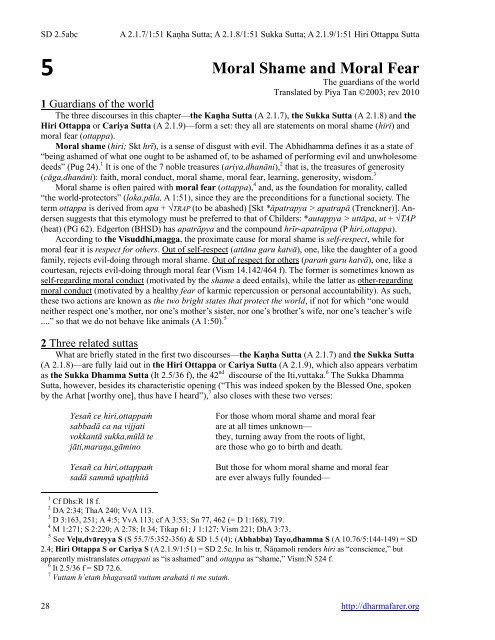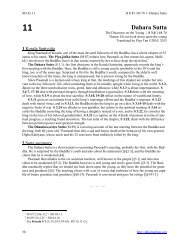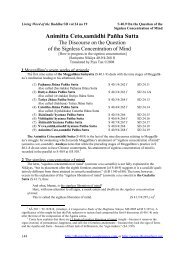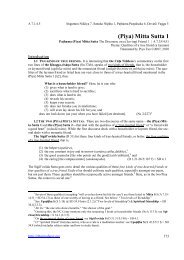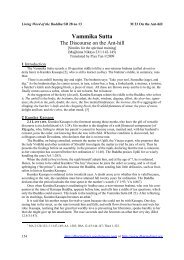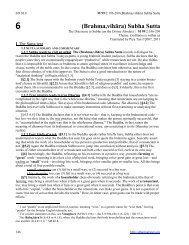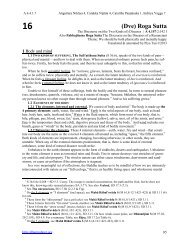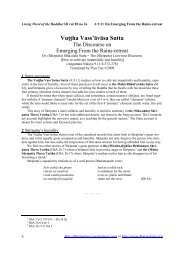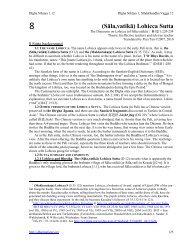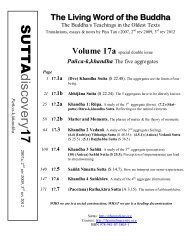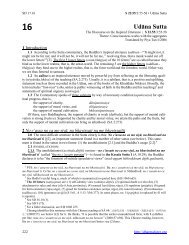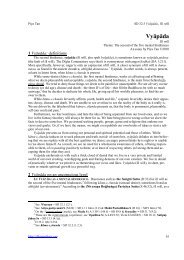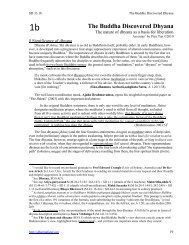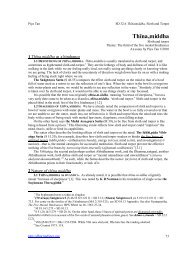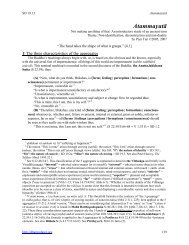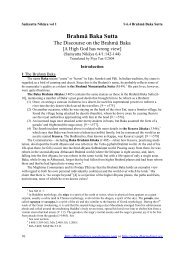Hiri Ottappa Sutta - The Dharmafarers
Hiri Ottappa Sutta - The Dharmafarers
Hiri Ottappa Sutta - The Dharmafarers
Create successful ePaper yourself
Turn your PDF publications into a flip-book with our unique Google optimized e-Paper software.
SD 2.5abc<br />
5<br />
A 2.1.7/1:51 Kaṇha <strong>Sutta</strong>; A 2.1.8/1:51 Sukka <strong>Sutta</strong>; A 2.1.9/1:51 <strong>Hiri</strong> <strong>Ottappa</strong> <strong>Sutta</strong><br />
Moral Shame and Moral Fear<br />
<strong>The</strong> guardians of the world<br />
Translated by Piya Tan ©2003; rev 2010<br />
1 Guardians of the world<br />
<strong>The</strong> three discourses in this chapter—the Kaṇha <strong>Sutta</strong> (A 2.1.7), the Sukka <strong>Sutta</strong> (A 2.1.8) and the<br />
<strong>Hiri</strong> <strong>Ottappa</strong> or Cariya <strong>Sutta</strong> (A 2.1.9)—form a set: they all are statements on moral shame (hiri) and<br />
moral fear (ottappa).<br />
Moral shame (hiri; Skt hrī), is a sense of disgust with evil. <strong>The</strong> Abhidhamma defines it as a state of<br />
“being ashamed of what one ought to be ashamed of, to be ashamed of performing evil and unwholesome<br />
deeds” (Pug 24). 1 It is one of the 7 noble treasures (ariya,dhanni), 2 that is, the treasures of generosity<br />
(cga,dhanni): faith, moral conduct, moral shame, moral fear, learning, generosity, wisdom. 3<br />
Moral shame is often paired with moral fear (ottappa), 4 and, as the foundation for morality, called<br />
“the world-protectors” (loka,pāla, A 1:51), since they are the preconditions for a functional society. <strong>The</strong><br />
term ottappa is derived from apa + √TRAP (to be abashed) [Skt *patrapya > apatrap (Trenckner)]. Andersen<br />
suggests that this etymology must be preferred to that of Childers: *autappya > uttpa, ut + √TAP<br />
(heat) (PG 62). Edgerton (BHSD) has apatrpya and the compound hrīr-apatrpya (P hiri,ottappa).<br />
According to the Visuddhi,magga, the proximate cause for moral shame is self-respect, while for<br />
moral fear it is respect for others. Out of self-respect (attna garu katv), one, like the daughter of a good<br />
family, rejects evil-doing through moral shame. Out of respect for others (para garu katv), one, like a<br />
courtesan, rejects evil-doing through moral fear (Vism 14.142/464 f). <strong>The</strong> former is sometimes known as<br />
self-regarding moral conduct (motivated by the shame a deed entails), while the latter as other-regarding<br />
moral conduct (motivated by a healthy fear of karmic repercussion or personal accountability). As such,<br />
these two actions are known as the two bright states that protect the world, if not for which “one would<br />
neither respect one’s mother, nor one’s mother’s sister, nor one’s brother’s wife, nor one’s teacher’s wife<br />
....” so that we do not behave like animals (A 1:50). 5<br />
2 Three related suttas<br />
What are briefly stated in the first two discourses—the Kaṇha <strong>Sutta</strong> (A 2.1.7) and the Sukka <strong>Sutta</strong><br />
(A 2.1.8)—are fully laid out in the <strong>Hiri</strong> <strong>Ottappa</strong> or Cariya <strong>Sutta</strong> (A 2.1.9), which also appears verbatim<br />
as the Sukka Dhamma <strong>Sutta</strong> (It 2.5/36 f), the 42 nd discourse of the Iti,vuttaka. 6 <strong>The</strong> Sukka Dhamma<br />
<strong>Sutta</strong>, however, besides its characteristic opening (“This was indeed spoken by the Blessed One, spoken<br />
by the Arhat [worthy one], thus have I heard”), 7 also closes with these two verses:<br />
Yesañ ce hiri,ottappaṁ<br />
sabbadā ca na vijjati<br />
vokkantā sukka,mūlā te<br />
jāti,maraṇa,gāmino<br />
Yesañ ca hiri,ottappaṁ<br />
sadā sammā upaṭṭhitā<br />
For those whom moral shame and moral fear<br />
are at all times unknown—<br />
they, turning away from the roots of light,<br />
are those who go to birth and death.<br />
But those for whom moral shame and moral fear<br />
are ever always fully founded—<br />
1 Cf Dhs:R 18 f.<br />
2 DA 2:34; ThaA 240; VvA 113.<br />
3 D 3:163, 251; A 4:5; VvA 113; cf A 3:53; Sn 77, 462 (= D 1:168), 719.<br />
4 M 1:271; S 2:220; A 2:78; It 34; Tikap 61; J 1:127; Vism 221; DhA 3:73.<br />
5 See Veḷu,dvāreyya S (S 55.7/5:352-356) & SD 1.5 (4); (Abhabba) Tayo,dhamma S (A 10.76/5:144-149) = SD<br />
2.4; <strong>Hiri</strong> <strong>Ottappa</strong> S or Cariya S (A 2.1.9/1:51) = SD 2.5c. In his tr, Ñamoli renders hiri as “conscience,” but<br />
apparently mistranslates ottappati as “is ashamed” and ottappa as “shame,” Vism:Ñ 524 f.<br />
6 It 2.5/36 f = SD 72.6.<br />
7 Vuttam h’etaṁ bhagavatā vuttam arahatâ ti me sutaṁ.<br />
28<br />
http://dharmafarer.org
A 2.1.1.7-9 Aṅguttara Nikāya 2, Duka Nipāta 1, Paṭhama Paṇṇāsaka 1, Kammakaraṇa Vagga 7, 8, 9<br />
virūḷha,brahmacariyā te<br />
they, prospering in the holy life,<br />
santo khīṇa,punabbhavâ ti are at peace with rebirth destroyed. (It 2.5/36 f)<br />
And it characteristically closes with “This matter [meaning], too, was spoken by the Blessed One. Thus I<br />
have heard.” 8 — — —<br />
SD 2.5a<br />
Kaṇha <strong>Sutta</strong><br />
<strong>The</strong> Discourse on the Dark | A 2.1.7/1:51<br />
A 2.1.1.7 = Aṅguttara 2, Duka Nipāta 1, Paṭhama Paṇṇāsaka 1, Kammakaraṇa Vagga 7<br />
<strong>The</strong>me: What are not the world-protectors<br />
Bhikshus, there are these two dark states. What are they<br />
<strong>The</strong> lack of moral shame and the lack of moral fear.<br />
<strong>The</strong>se, bhikshus, are the two dark states.<br />
SD 2.5b<br />
— evaṁ —<br />
Sukka <strong>Sutta</strong><br />
<strong>The</strong> Discourse on the Bright | A 2.1.8/1:51<br />
A 2.1.1.8 = Aṅguttara 2, Duka Nipāta 1, Paṭhama Paṇṇāsaka 1, Kammakaraṇa Vagga 8<br />
<strong>The</strong>me: What are the world-protectors<br />
Bhikshus, there are these two bright states. What are they<br />
Moral shame and moral fear.<br />
<strong>The</strong>se, bhikshus, are the two bright states.<br />
SD 2.5c<br />
— evaṁ —<br />
<strong>Hiri</strong> <strong>Ottappa</strong> <strong>Sutta</strong><br />
<strong>The</strong> Discourse on moral shame and moral fear | A 2.1.9/1:51<br />
Cariya <strong>Sutta</strong> <strong>The</strong> Discourse on Conduct<br />
A 2.1.1.9 = Aṅguttara 2, Duka Nipāta 1, Paṭhama Paṇṇāsaka 1, Kammakaraṇa Vagga 9<br />
<strong>The</strong>me: <strong>The</strong> two qualities that are world-protectors<br />
Bhikshus, there are two bright states 9 that protect the world.<br />
What are the two<br />
Moral shame and moral fear.<br />
Bhikshus, if these two bright states were not to protect the world, then there would be no mothers, nor<br />
mothers’ sisters, nor uncles’ wives, nor teachers’ wives, nor the wives of respected. 10 Instead, the world<br />
would come to confusion such as there is amongst goats and sheep and fowl and pigs and dogs and jackals.<br />
8 Ayam pi attho vutto bhagavatā, iti me sutan ti.<br />
9 “Bright states,” sukka dhamma, that is, wholesome conditions. See (Vitthāra) Kamma S (A 4.232) = SD 4.13<br />
Intro (2.1).<br />
10 Comy: Of those worthy of respect, such as one’s paternal elder brother (one’s elder uncle), one’s paternal<br />
younger brother (one’s younger uncle), and so on (ItA 159). AA is silent.<br />
http://dharmafarer.org 29
SD 2.5abc<br />
A 2.1.7/1:51 Kaṇha <strong>Sutta</strong>; A 2.1.8/1:51 Sukka <strong>Sutta</strong>; A 2.1.9/1:51 <strong>Hiri</strong> <strong>Ottappa</strong> <strong>Sutta</strong><br />
But, bhikshus, since these two bright states do protect the world, therefore there are seen mothers,<br />
mothers’ sisters, uncles’ wives, teachers’ wives and wives of the respected.<br />
— evaṁ —<br />
120201<br />
30<br />
http://dharmafarer.org


